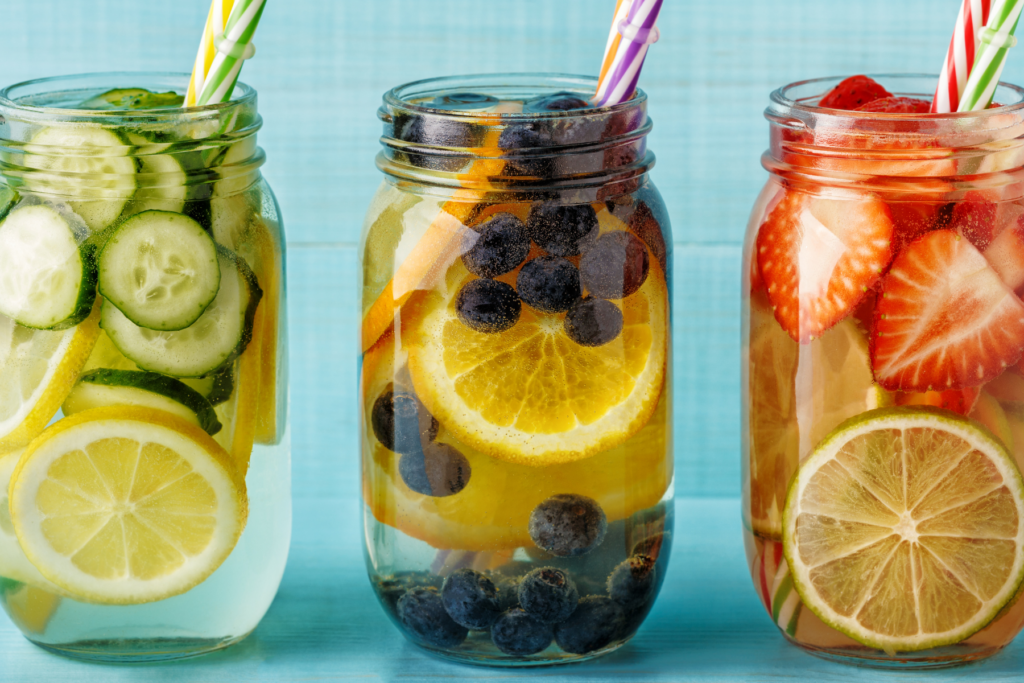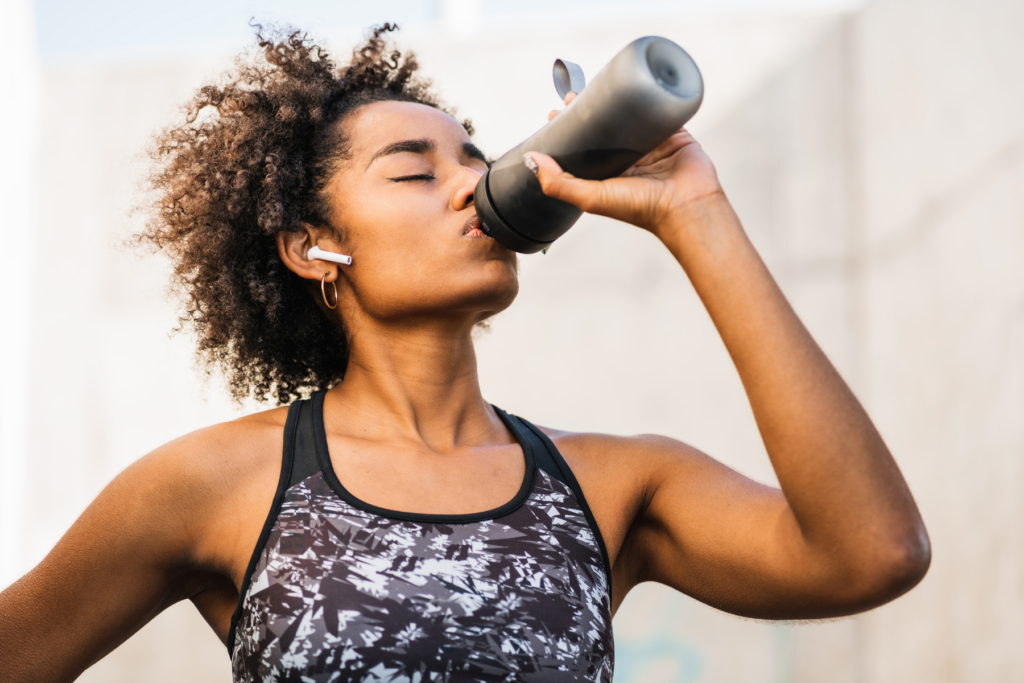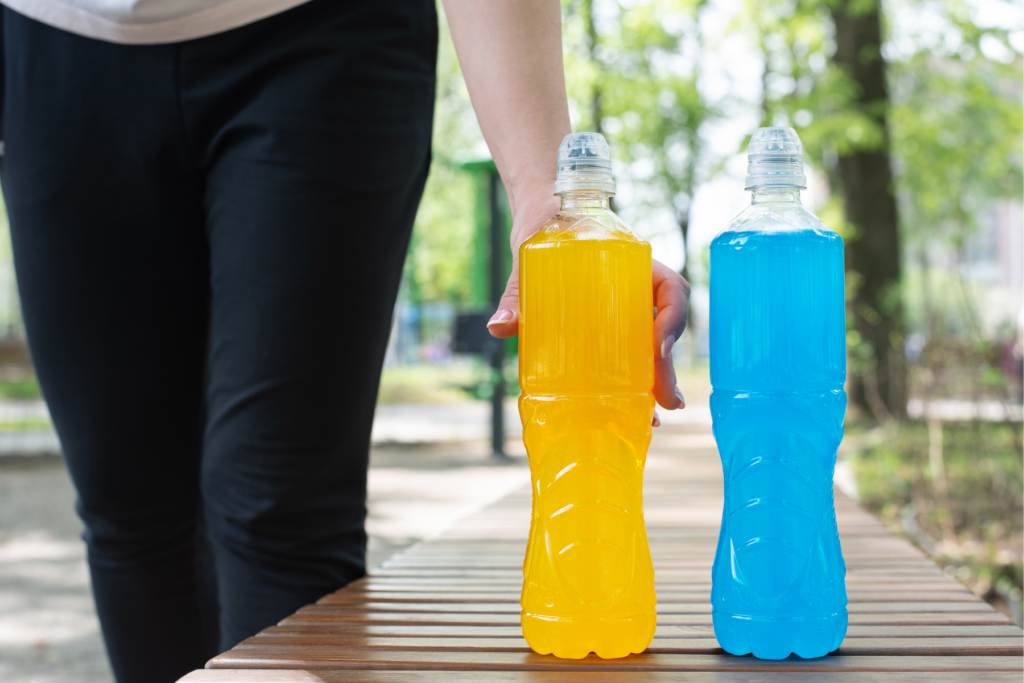Hydration Recommendations for Athletes and Active Individuals
June 21, 2025

Hydration is essential as an athlete or active person. Did you know that athletes and active people are at a higher risk of dehydration?
Whether you’re a high level athlete, active gym goer, or regular runner, you may be wondering how much water should I drink a day?
Why Is Hydration Important?
While exercising, your body loses fluids through sweat via your skin as well as through your lungs due to increased breathing. Losing just 2% of body weight in sweat is defined as dehydration! As little as 1% loss of body weight or water can negatively impact performance.
Without proper hydration, you may experience muscle cramps, gastrointestinal discomfort like diarrhea, nausea or vomiting, decreased reaction time or be at an increased risk of injury.
In addition, conditions like higher temperatures or high altitude, dryer climates and caffeine intake can all influence hydration status. Therefore, it is important to know when and how to hydrate your body and understand when to drink water versus a sports drink that contains electrolytes.
So, How Much Do I Need?

First off, it’s important to remember that it’s not just water that’s important. What counts as water when drinking is really all food and drinks that contribute fluid to the body.
When it comes to how much to drink, following a hydration schedule can help ensure you are drinking enough water.
Sample Hydration Schedule:
- 2 hours before training: drink 16-24 oz of fluids (this amounts to about 2-3 8 oz cups)
- 30 minutes before training: drink 8oz water (1 cup)
- Throughout exercise: drink 4oz (half a cup) about every 10-20 minutes (amounts to about 4 large swigs)
- After exercise: there are a few ways to determine your hydration needs after exercise. Some include analyzing the color of your urine (the darker it is, the more dehydrated you are) or gauging your thirst levels. Technically, if you are thirst – research indicates you may already be dehydrated.
- If you want to get more technical, the easiest to individualize your hydration needs post-exercise is to do a sweat test. To complete a sweat test, weigh yourself before exercising and then weigh yourself after to measure the amount of sweat lost. This will help determine how many fluids you need to replenish with. For every pound lost, replenish with 16 oz (2 cups) within 1-2 hours of exercise.
What About Electrolytes?

Now, let’s break down what electrolytes are and when you should be consuming a sports drink in addition to water.
Electrolytes are compounds in the body that assist with muscle and heart function, fluid regulation as well as hydration status to name a few. Sweat is composed of water as well as electrolytes sodium, chloride, potassium and magnesium. Similar to how water is lost through sweat, electrolytes are also lost. While sodium and chloride are lost at higher rates, we also lose potassium, calcium and magnesium (though not as much). Therefore, it is essential that we replenish them.
If you’re not properly replenishing electrolytes, it will be hard to optimally rehydrate.
The general recommendation is to choose a sports drink for any intensive exercise longer than 1 hour.
So, what should you look for in a hydration drink?
- 5-10% carbohydrates (coming from glucose and sucrose)
- Aim for 150-180 mg of sodium per 8 fluid oz
- 60-75 mg of potassium per 8 fluid oz
- At least 500 mg per liter (33.8 oz)
- Chloride is not included on the ingredient list because dietary salt is in the form of sodium chloride
During training – avoid drinks with >8% carbohydrate concentration. For instance, gatorade has 22g grams of carbohydrates per mL/calories which is 6% carbohydrate concentration. Too little carbohydrate can causes cramping, GI distress and decreased absorption of fluids.
To calculate the carbohydrate concentration, you would do:
- (Total Carbohydrate / Serving Size) x 100.
- For example, to calculate the carbohydrate concentration of Nuun Sport, you would take:
- 4g (carbohydrates) / 5.5 g (serving size of 1 Nuun Sport tablet) x 100 = 72.73%
As a rule of thumb, choose products higher in carbohydrates (something closer to 8-10% carbohydrate concentration) throughout endurance activities like marathon or triathlon training. These carbohydrates will provide energy to get you through the next five miles of your run or bike ride.
Choose lower carbohydrate options and higher electrolyte products when you are looking to replace electrolytes after a shorter workout where you sweat a significant amount and are looking to replace what you lost in sweat (think re-hydration).
What Sports Drink Should I Choose?
| Indications | Carbs | Carb Conc. | Sodium | Potassium | Magnesium | Calcium | |
| Nuun Endurance | Higher carbohydrate option than Nuun Sport. Recommended for >1 hr intensive training (ex: marathon training – carbohydrates can help refuel during long runs, long practices, sports games) due to higher carbohydrate concentration | 16g | 84% | 380mg | 200mg | 20mg | 15mg |
| Nuun Sport | Lower carbohydrate option Recommended for moderate intensity workout (ex: after weight lifting or a heavy sweat/exercise in the heat) | 4g (dextrose) | 72% | 300mg | 150mg | 25mg | 13mg |
| Klean Hydration | Higher carbohydrate option Recommended for >1 hr intensive training (ex: marathon training – carbohydrates can help refuel during long runs, long practices, sports games) | 16g | 89% | 180mg | 70mg | 25mg | 35mg |
| Tailwind Endurance | Higher carbohydrate option Recommended for >1 hr intensive training (ex: marathon training – carbohydrates can help refuel during long runs, long practices, sports games) due to higher carbohydrate concentration *Contains caffeine | 25g | 93% | 310mg | 90mg | 12mg | 27mg |
| Gatorlyte | High sodium, no carbohydrates Because this drink has no carbohydrates, it’s not recommended to be consumed throughout an endurance workout. This drink is better for a super heavy sweater or after a tough workout in the heat to replace lost electrolytes | 0g | 0% | 780g | 400mg | 40mg | 80mg |
| LMNT | High sodium, lower carbohydrate option Similar to the Gatorlyte option, because this drink does not have a significant source of carbohydrates, it’s not recommended to be consumed throughout an endurance workout. This drink is better for a super heavy sweater or after a tough workout in the heat to replace lost electrolytes. *Contains stevia – if you are sensitive to artificial sweeteners and notice that they cause GI distress, I recommend skipping this product | 2g | 1% | 1000mg | 200mg | 60mg | |
| Liquid IV | High sodium, moderate carbohydrate *Recommended for a super heavy sweater or after a tough workout in the heat. Can also be used throughout exercise for carbohydrate fuel | 12g | 500mg | 370mg | 1mg | ||
| Skratch Sports Hydration Mix | Recommended for >1 hr intensive training (ex: marathon training – carbohydrates can help refuel during long runs, long practices, sports games) *Contains glucose and fructose | 20g | 380g | 38mg | 38mg | 43mg | |
| Thorne Electrolytes | Lower carbohydrate option Good recovery option post moderate-intense sweat (ex: weight lifting, low impact training) | 5g | 485mg | 96mg | 40mg | 80mg | |
| Biosteel | Lower carbohydrate option Good recovery option post moderate sweat workout (ex: weight lifting, low impact training) | 1g | 140mg | 33mg | 5mg | 18mg | |
| Honey Stinger Hydration Mix | Good source of carbohydrates prior to workout. Consider as fuel if you have a low tolerance of meals before exercising *2 tsp in 16 fl oz water | 8g | 270mg | 92mg | 2mg | ||
| Drip Drop | Recommended for >1 hr intensive training (ex: marathon training – carbohydrates can help refuel during long runs, long practices, sports games) due to higher carbohydrate concentration *Contains sucralose and zinc aspartate | 9g | 90% | 330mg | 185mg | 39mg |